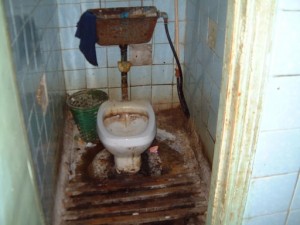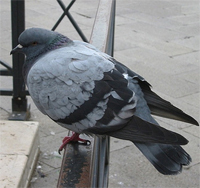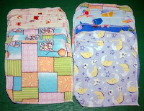Excrement
Johnson Smith Catalog Item #12

The choices are:
I'M READIN'
DOIN' MY CHORES
WASHIN' MY FEET
TRIMMIN' MY TOENAILS
TAKIN' A NAP
JIST RESTIN'
NONE OF YER BIZNESS
From the 1950 catalogue.
Posted By: Paul - Fri Oct 28, 2011 -
Comments (3)
Category: Humor, Hygiene, Body Fluids, Excrement, Flatulence, Ineptness, Crudity, Talentlessness, Kitsch, and Bad Art, Johnson Smith Catalog, 1950s
Numi Toilet
Longtime WU-vies know all about the Japanese fascination with complex automated toilets. Now there's one for the USA market.
And for only $6400.00!
Read a review here.
Posted By: Paul - Thu Oct 13, 2011 -
Comments (5)
Category: Domestic, Appliances, Hygiene, Baths, Showers and Other Cleansing Methods, Body Fluids, Excrement, Flatulence, Money, Outrageous Excess
World Toilet Day

Posted By: Paul - Wed Nov 17, 2010 -
Comments (5)
Category: Holidays, Hygiene, Body Fluids, Excrement
What A Way To Go

Posted By: Nethie - Sat Sep 04, 2010 -
Comments (4)
Category: Accidents, Animals, Death, Excrement, More Things To Worry About, Australia
Weird Science – From Whales To Sails

Sperm whales are still the largest animal ever to have teeth, but today their diet consists mostly of squid – including the infamous giant squid – and therein lies a problem. Whereas most land dwelling creatures live on plant material, or some juicy meaty derivative thereof, and hence are essentially “carbon-neutral”, marine animals from penguins to whales feast upon carbon that was probably sequestered in the oceans hundreds if not thousands of years ago, or has weathered out of rocks that are millions of years old. One upshot of this is that carbon dating is notoriously inaccurate on marine organisms, what scientists call the “reservoir effect”, another is that unlike water breathers such as fish, who return this carbon to the oceans, air breathing animals like whales will release this carbon to the atmosphere as CO2 and so contribute to global warming. However in new research published by the Royal Society of London, researchers have calculated that whales have actually offset their carbon emissions with emissions of another kind. Whale poop is iron rich and comparatively liquid, hence returns the excess iron in the whale’s diet back to the oceans in a form that is readily usable by phytoplankton. The team, led by Trish Lavery of Flinders University in Australia, estimate that sperm whales are responsible for removing 200,000 more tonnes of carbon from the atmosphere annually than they actually emit (Royal Society).
But it’s not all good news for the tree-huggers for while whales might be a boon in the fight against climate change, their free-range, organic farming practices of preference are almost certainly not. In a paper published by the National Academy of Sciences, Jennifer Burney of Stanford University and her colleagues have found that intensive farming is by far the most land and carbon efficient method of agriculture. Because agricultural land use is a major contributor to global warming, increasing the yields from farmland, and thereby reducing the amount of land farmed, strongly outweighed the extra carbon emissions of the intensive farming needed to achieve this. Doing the sums on farm outputs since 1961, the team found that increased yields have produced the same as cultivating an additional area the size of Russia at 1961 levels, which would have led to the release of 590 billion more tonnes of CO2, equal to about a third of all man-made emissions since the industrial revolution (PNAS).
And modern farming may be coming to our rescue in another way, as a source of cheap batteries. Almost since Ben Franklin gave up kite-flying, kids in schools the world over have been making batteries out of apples or a potatoes. Now a trio of researchers from the Hebrew University of Jerusalem, led by Alex Goldberg, have found a way to turn these vegetable power sources from classroom curiosities into a viable product. What’s more amazing is the method they discovered to generate a tenfold increase the output of their potato power-pack, they boil the potato first. How did no-one think of this before (AIP)?
Another new idea, albeit a less welcome one, is that one should prosecute scientists for not knowing everything. At least that seems to be the approach taken by the public prosecutors of the Italian city of L’Aquilla, which last year was hit unexpectedly by an earthquake that killed over 300 people and injured 1600 more. The defendants include the head of Italy’s National Institute of Geophysics and the director of the National Earthquake Center along with four other equally prominent scientists and Bernardo De Bernardinis then deputy head of the Civil Protection Agency, who together are looking at being tried for manslaughter for not alerting the population to the imminent disaster at a meeting held one week before the quake struck. It was Bernardinis, a government official, who claimed in a press conference held immediately after the meeting that the scientists had said there was “no danger”, despite the minutes of the meeting clearly showing that at no time was the chance of a major shock ever ruled out (Nature).
More in extended >>
Posted By: Dumbfounded - Fri Jul 02, 2010 -
Comments (7)
Category: Agriculture, Animals, Dinosaurs and Other Extinct Creatures, Farming, Disasters, Exercise and Fitness, Food, Government, Health, Nature, Natural Resources, Science, Psychology, Excrement
Just Some Weird Crap!

Perhaps he should have contacted Ireland’s first official dog-waste removal company, Mr. Scoopy-Poo. The brainchild of Irish entrepreneur William O’Brian, Mr. Scoopy-Poo (motto, “Business stinks – but it’s picking up!”) will clean up after your dirty dogs into biodegradable bags and hygienically dispose of them, for a price of course. After all, where there’s muck there’s brass, and occasionally diamonds (Irish Examiner).
But O’Brian may be missing a trick here, why dispose of faeces when you could be selling it as the latest must have fashion item? What sounds like insanity may be an idea whose time has come. How else can you explain not one but two manure-based products in the same week?
First up is London based artist and designer INSA, who has produced a pair of 10” stilettos incorporating elephant dung. And this isn’t just dung from any old elephant either, this is dung from the very same elephant family that produced the infamous extra ingredient for a series of paintings made by artist Chris Ofili in the 90s. Yup, in these shoes you are literally standing on celebrity elephant dung (Huffington Post).
And hot on the precipitous heels of INSA is Geneva based watchmaker Yvan Arpa, who has crafted his latest $11,000 wrist-candy from toad skin and dinosaur doo. The watches, to be made and sold by Swiss watchmakers Artya, feature a face cut from a 100 million year-old “coprolite”, or fossil faeces, left behind by an ancient plant-eater in what is now the United States. And the quality American materials don’t just amount to a pretty face as the strap is lovingly crafted from the hide of an American cane toad. The mechanism though is pure Swiss craftsmanship (Star Tribune).
Image: Maggie Smith / FreeDigitalPhotos.net
Posted By: Dumbfounded - Tue Mar 16, 2010 -
Comments (4)
Category: Animals, Design and Designers, Fashion, Shoes, Pets, Dogs, Excrement
A Little Light Weirdness - 6

And if kissing ass isn’t your thing, perhaps you’d like to crawl through one instead? You can at a new exhibit called Grossology, which opens at the Museum of Discovery and Science in Fort Lauderdale on Saturday. Subtitled “The (Impolite) Science of the Human Body” the exhibits also include a tour of the nose, a giant replica of human skin and an interactive experiment in flatulence called “Burp Man” (Miami Herald).
Not kissing but kicking ass are the pensioners of Bavaria in Germany, who decided not to take the credit crunch lying down. After their financial adviser, James Amburn, handed them losses in excess of 2.3 million euros, five OAPs tracked him to his home in Speyer, kidnapped him, and tortured him into faxing a Swiss bank for the money to pay them back. Instead he managed to alert the police. Mr. Amburn later confided that his four day ordeal was perhaps extended by his kidnappers having to stop a while when they ran out of breath (Mirror).
Also taking a little longer than usual were the German actors appearing in Erofeev’s satirical play “Moscow to the End of the Line”, alternatively billed as a “crazy depiction of one of the most famous alcoholic benders in world literature”. In an ill-considered attempt at method acting four of the performers decided to swap the water in the props for real vodka “as an experiment", only to fall off their chairs, and the stage, before inviting audience members to take a swig. They were later taken to hospital under a police escort to have their stomachs pumped (Guardian).
More outrage now, this time from Great Britain, where in a clear breach of their normal high standards of decorum, British mums have been seen shopping in the Tesco supermarket chain in pyjamas and slippers. In fact more outrage seems to have been directed at Tescos, who have implemented a dress code and now escort anyone so attired from their premises, than at the mums, They should all just be thankful they don’t have Walmarts, that’s all I’m saying (Mirror).
Posted By: Dumbfounded - Fri Jan 29, 2010 -
Comments (3)
Category: Body, Buildings and Other Structures, Fashion, Inebriation and Intoxicants, Shopping, Body Fluids, Excrement, Flatulence, Alcohol, Goofs and Screw-ups
Wallypop Toilet Wipes
 This must have been what people used back in the days before the invention of toilet paper. You just wipe and then throw the soiled cloth into a bag, ready to be taken out to the laundry. One benefit is that it allows you to wipe with a wet cloth, which gets you a lot cleaner. However, it would seem to me that it's going to substantially increase the amount of laundry you've got to do (since you want to keep the soiled wipes separate from the rest of your laundry). So would they really save you money, or be any better for the environment?
This must have been what people used back in the days before the invention of toilet paper. You just wipe and then throw the soiled cloth into a bag, ready to be taken out to the laundry. One benefit is that it allows you to wipe with a wet cloth, which gets you a lot cleaner. However, it would seem to me that it's going to substantially increase the amount of laundry you've got to do (since you want to keep the soiled wipes separate from the rest of your laundry). So would they really save you money, or be any better for the environment?Thanks to Prof. Music for the contribution.
Posted By: Alex - Sat Feb 28, 2009 -
Comments (5)
Category: Bathrooms, Hygiene, Excrement
Sludge Management
Posted By: Paul - Thu Feb 12, 2009 -
Comments (1)
Category: Education, Hygiene, Body Fluids, Excrement, Documentaries
Follies of the Mad Men #55
[From Look magazine for 12-18-62.]Of course, every beautiful young woman I know always asks for prune juice in a cocktail glass whenever she's out in public.
Posted By: Paul - Mon Feb 09, 2009 -
Comments (5)
Category: Business, Advertising, Products, Food, Excrement, 1960s

| Who We Are |
|---|
| Alex Boese Alex is the creator and curator of the Museum of Hoaxes. He's also the author of various weird, non-fiction, science-themed books such as Elephants on Acid and Psychedelic Apes. Paul Di Filippo Paul has been paid to put weird ideas into fictional form for over thirty years, in his career as a noted science fiction writer. He has recently begun blogging on many curious topics with three fellow writers at The Inferior 4+1. Contact Us |





